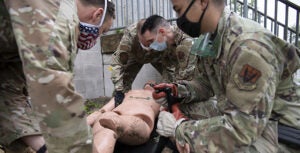
The Defense Advanced Research Projects Agency (DARPA) on Tuesday announced five performers to develop a framework for trustworthy artificial intelligence (AI)-based algorithms to make decisions in moments when every second counts and there is no right answer and decision-makers disagree. The selectees will conduct their work in two phases, the first being small unit triage in austere environments and the second phase being mass casualty triage. The “In The Moment” (ITM) program performers include: Raytheon Technologies’ [RTX] BBN Technologies unit…

 By
By 










